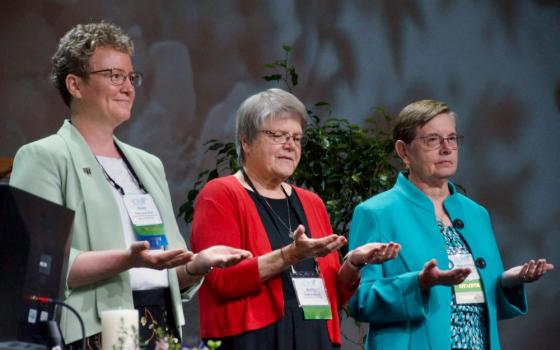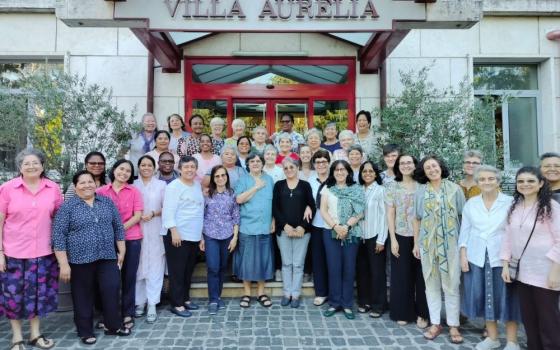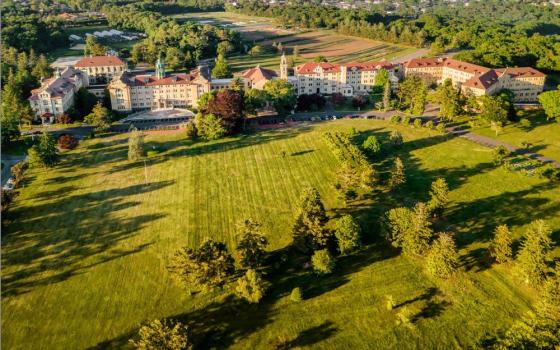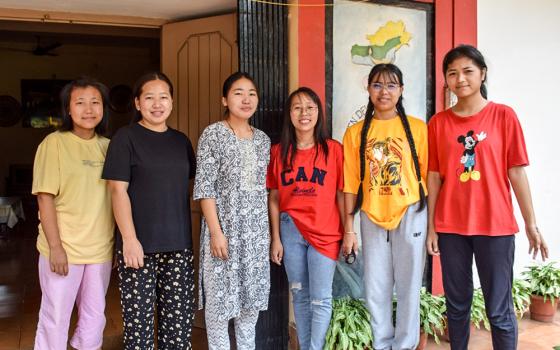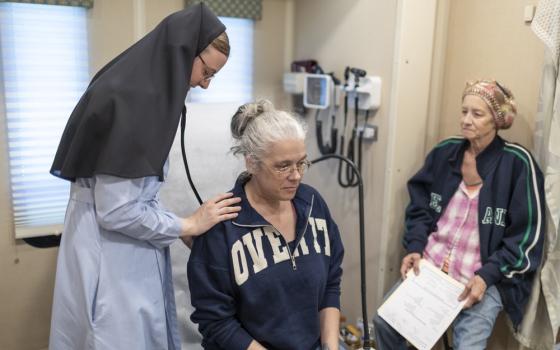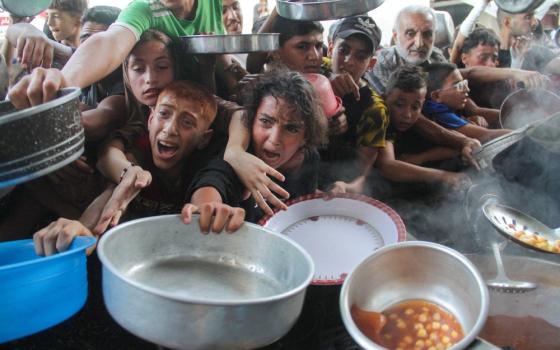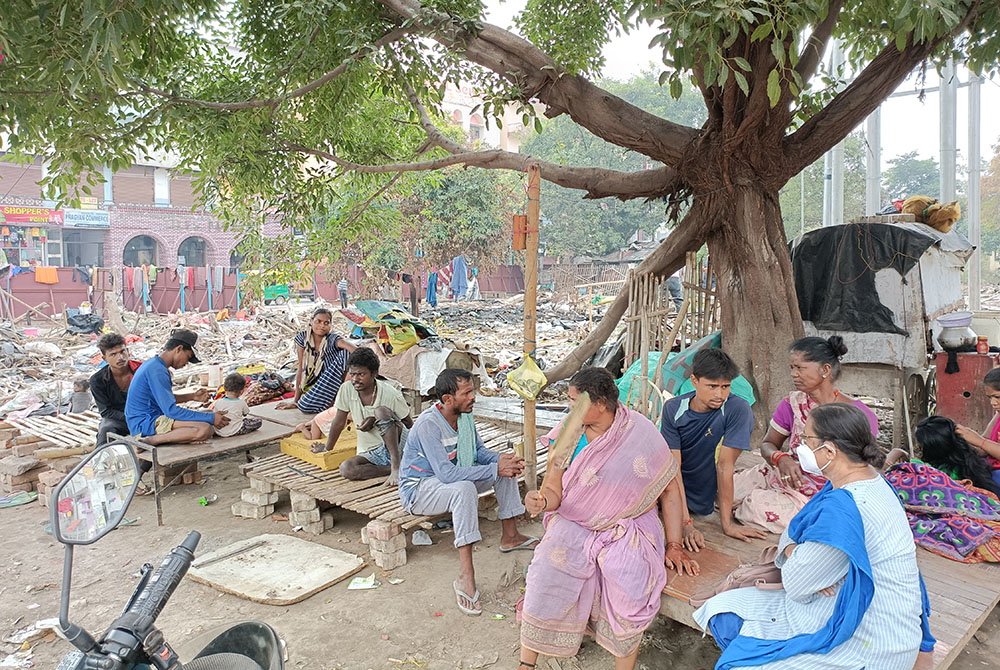
People sit at the site of their demolished homes Oct. 9 in Malaai Pakkdi, a settlement in Kankarbagh, Patna city, in Bihar state, in India. (Courtesy of Dorothy Fernandes)
I always say: "The unseen and unheard people of every city, offer their services to city-goers; they are then hounded to leave the city with no right to live in, what they have designed."
Those who live on the periphery of our society are being evicted from their homes in a most inhuman and brutal manner. The insecurity and fear in which the people in poverty live in the city of Patna, India, is unimaginable. Officials at the helm of affairs who have the power to make decisions and ruin the lives of these hard-working communities, seem to have no qualms of conscience after they have undertaken an eviction operation. It's perceived as an achievement — an accomplishment — to bulldoze the homes of these people and render them homeless in the open air.
This seems to be gradually becoming a norm around the country and the globe. Development is important, but we must ask ourselves: who pays the price of development? Who benefits from the development that takes place?
It appears that the ones who clean, beautify and make our city what it is have no right to live in it, simply because they do not have the means to acquire a piece of land and find shelter. As human rights activists, where do we even begin? Who takes responsibility for such cowardly acts?
Consider the community in Malaai Pakkdi, a settlement in Kankarbagh, Patna city, in Bihar state, in India. The Patna Metro rail is supposed to be built where this community has been residing for some 50 to 60 years — when the place was a forest with wild animals. The older members share their stories about how it was to have the wild animals around. Through the years they filled and leveled the land, and as the families grew, the number of huts that housed the community also increased. Most members of the community are not literate but they have wisdom, and are alert to the happenings around them.
They were aware of the fact that the Metro would be coming and that they would be evicted. With this information and after verifying these facts, we began to appeal to the chairman of the Metro rail.
A night shelter for the homeless has been set up in the same vicinity. I am a member of the Shelter for Urban Homeless, appointed by the state by the Supreme Court. We visited one night and told the community representatives that they should meet with the principal secretary, who was visiting the shelter. I was accompanying the secretary and I put in a word to him: He met with them and asked if they would move if they were offered a piece of land elsewhere. They replied positively — provided it was not too far from where they worked.
Then on May 21 the bulldozer came to demolish the homes of the people. My team members and I rushed to the site and opposed the demolition until such time as the people could be properly rehabilitated. The operation was stopped.
Advertisement
I took this up with the chief secretary of Bihar and he reminded the principal secretary that it was his moral duty to rehabilitate the people. Just two days later, on May 23, in spite of all these efforts — and after the community's adults had gone to work — the bulldozer razed their homes to the ground, ignoring the children who courageously asked, "Why are you demolishing our homes? We are eating; let us finish!" But nothing stopped the hard-hearted officials who were bent on accomplishing their task.
Since then, on various occasions, we have taken every opportunity to remind him of his promise. But to no avail. We have sent a number of messages and letters — the bureaucrat simply failed to honor his word.
A very brutal incident took place on Oct. 5 at Malaai Pakkdi. Again, without notice the officials came with the bulldozers to attack and bulldoze the homes of the people who lived on the other side of the street. The people resisted and the police force came in huge numbers with electronic lathis (clubs) to attack the people.
Rajesh Thakur, a vendor who ran a tea shop on a cart, was removing his belongings from his nearby hut when he was struck allegedly during the police charge. He later died.
Since then, it has been a real nightmare; we got his wife to lodge a complaint and register a First Information Report, but the police will not accept this because she has gone to her village to perform the rites customary when someone dies.
It is very clear to me that the man succumbed to his injury due to the lathi charge by the police. The bureaucrats and the police are spreading a story that there was violence, and in the course of the attack he was hit and so he died.
The wife has given her consent for us to fight this case of injustice, but we have a long journey to undertake as we have taken on the administration. We will stand by Sulekhadevi, the widow, who is just 35 years old, with five children — the eldest only 15 years old.
In the meantime, neither the bureaucrats, nor the elected representatives of the people have visited the site. The children are hungry, as their cooking utensils have been crushed by the bulldozer; they have nothing but the clothes they are wearing. Our team immediately responded to their hunger, and began cooking food and serving them hot food for four days.
The gracious financial support by our provincial team has enabled us to reach out to the community. We have appealed for clothes and were able to find some for the victims.
Oct. 5-12 has been a very difficult journey; I have been unable to sleep, hearing the voices keep echoing; seeing the scenes of people sleeping under the open sky, young girls and women made so vulnerable — and yet no one takes responsibility. At times it is very difficult to understand who plans a city; who implements the plans; and who pays the price of these projects.
The words of a Bob Dylan song keep ringing in my ears:
How many roads must a man walk down
Before you call him a man? …
Yes n' how many times must the cannonballs fly? …
The answer, my friend, is blowin' in the wind …
Yes n' how many years can some people exist
Before they're allowed to be free?

